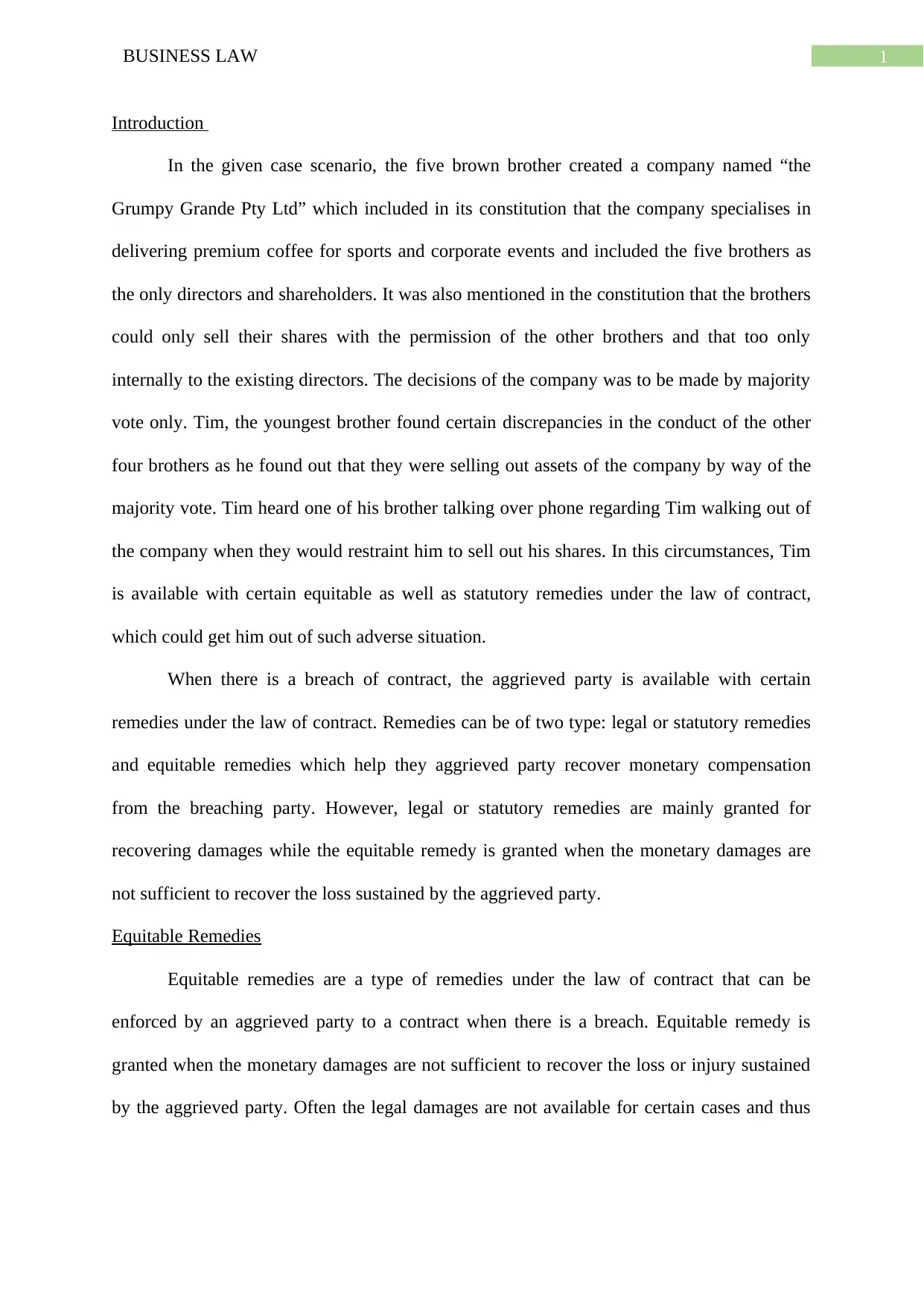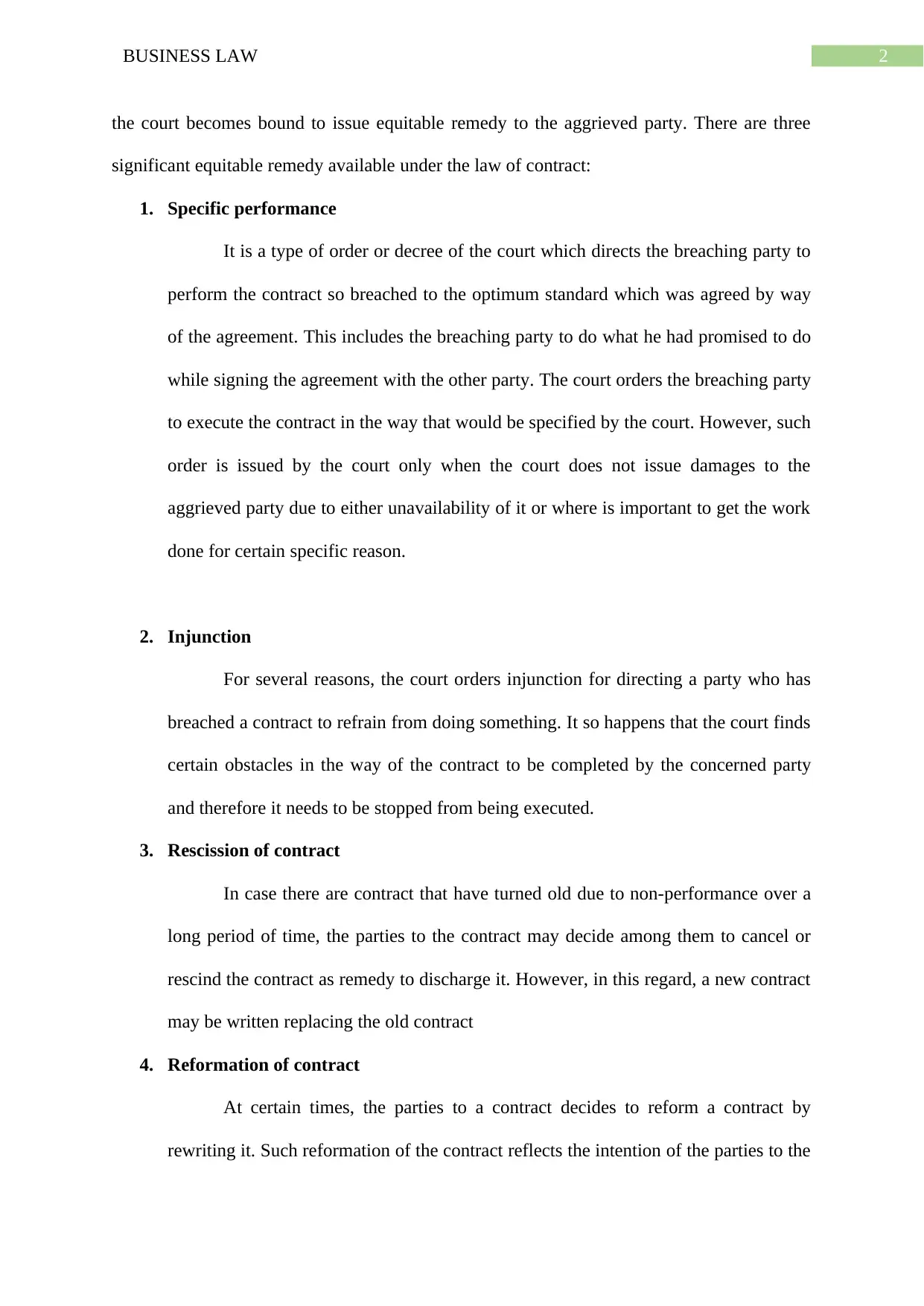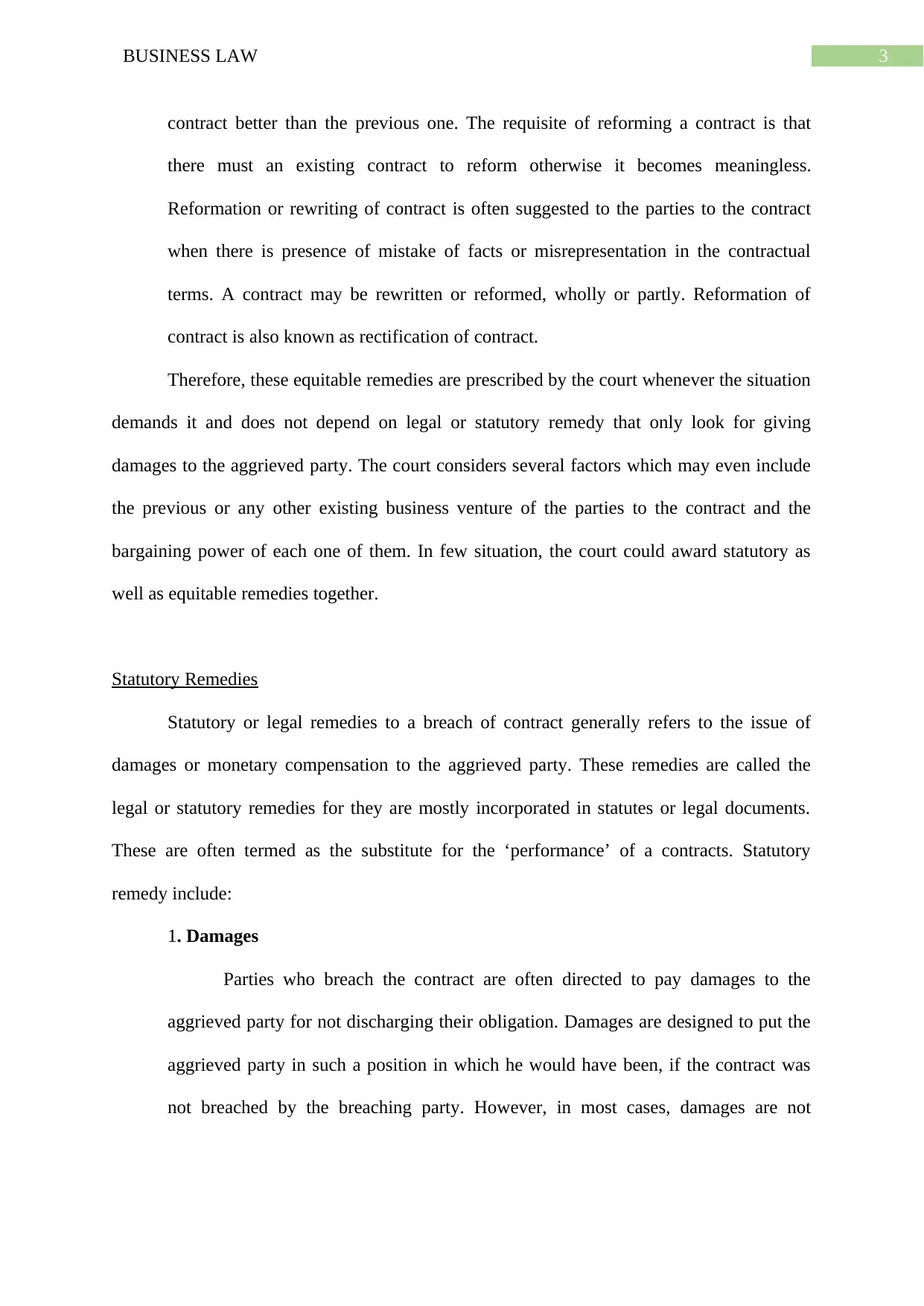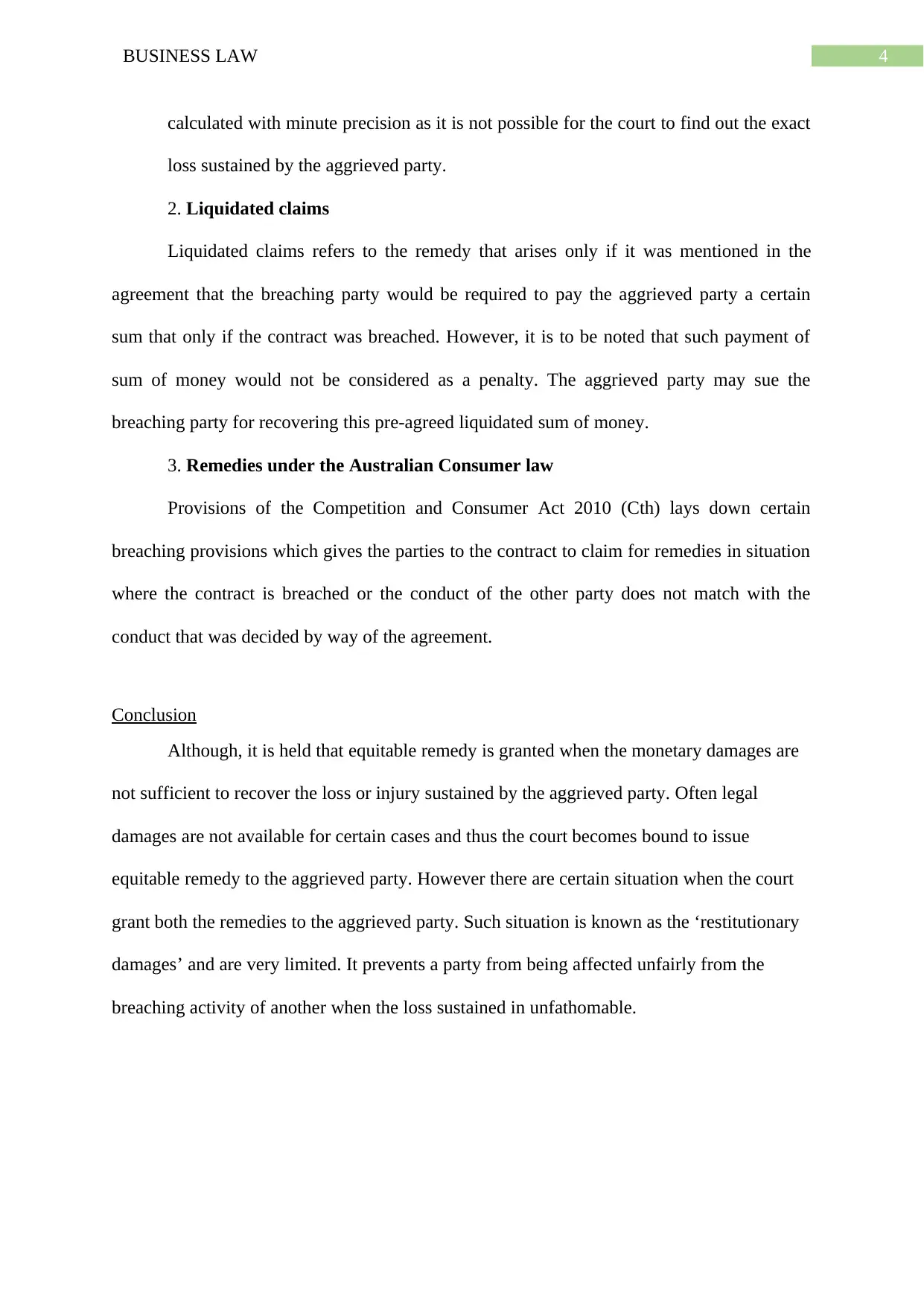Corporate Law Assignment: Remedies for Contract Breach (BO1CLAW314)
VerifiedAdded on 2023/01/04
|6
|1298
|61
Report
AI Summary
This assignment analyzes a case scenario involving "The Grumpy Grande Pty Ltd" and the remedies available to a shareholder, Tim, when faced with potential breaches of the company constitution by his brothers. The report examines both equitable and statutory remedies under contract law. It details equitable remedies such as specific performance, injunction, rescission, and reformation of contract, explaining their application when monetary damages are insufficient. The report also covers statutory remedies, including damages, liquidated claims, and remedies under the Australian Consumer Law. It emphasizes the circumstances under which courts may grant either or both types of remedies, and it references relevant legal documents and case law, providing a comprehensive overview of available legal options for Tim to address the issues within the company.

Running head: BUSINESS LAW
Business Law
Name of the Student
Name of the University
Author Note
Business Law
Name of the Student
Name of the University
Author Note
Paraphrase This Document
Need a fresh take? Get an instant paraphrase of this document with our AI Paraphraser

1BUSINESS LAW
Introduction
In the given case scenario, the five brown brother created a company named “the
Grumpy Grande Pty Ltd” which included in its constitution that the company specialises in
delivering premium coffee for sports and corporate events and included the five brothers as
the only directors and shareholders. It was also mentioned in the constitution that the brothers
could only sell their shares with the permission of the other brothers and that too only
internally to the existing directors. The decisions of the company was to be made by majority
vote only. Tim, the youngest brother found certain discrepancies in the conduct of the other
four brothers as he found out that they were selling out assets of the company by way of the
majority vote. Tim heard one of his brother talking over phone regarding Tim walking out of
the company when they would restraint him to sell out his shares. In this circumstances, Tim
is available with certain equitable as well as statutory remedies under the law of contract,
which could get him out of such adverse situation.
When there is a breach of contract, the aggrieved party is available with certain
remedies under the law of contract. Remedies can be of two type: legal or statutory remedies
and equitable remedies which help they aggrieved party recover monetary compensation
from the breaching party. However, legal or statutory remedies are mainly granted for
recovering damages while the equitable remedy is granted when the monetary damages are
not sufficient to recover the loss sustained by the aggrieved party.
Equitable Remedies
Equitable remedies are a type of remedies under the law of contract that can be
enforced by an aggrieved party to a contract when there is a breach. Equitable remedy is
granted when the monetary damages are not sufficient to recover the loss or injury sustained
by the aggrieved party. Often the legal damages are not available for certain cases and thus
Introduction
In the given case scenario, the five brown brother created a company named “the
Grumpy Grande Pty Ltd” which included in its constitution that the company specialises in
delivering premium coffee for sports and corporate events and included the five brothers as
the only directors and shareholders. It was also mentioned in the constitution that the brothers
could only sell their shares with the permission of the other brothers and that too only
internally to the existing directors. The decisions of the company was to be made by majority
vote only. Tim, the youngest brother found certain discrepancies in the conduct of the other
four brothers as he found out that they were selling out assets of the company by way of the
majority vote. Tim heard one of his brother talking over phone regarding Tim walking out of
the company when they would restraint him to sell out his shares. In this circumstances, Tim
is available with certain equitable as well as statutory remedies under the law of contract,
which could get him out of such adverse situation.
When there is a breach of contract, the aggrieved party is available with certain
remedies under the law of contract. Remedies can be of two type: legal or statutory remedies
and equitable remedies which help they aggrieved party recover monetary compensation
from the breaching party. However, legal or statutory remedies are mainly granted for
recovering damages while the equitable remedy is granted when the monetary damages are
not sufficient to recover the loss sustained by the aggrieved party.
Equitable Remedies
Equitable remedies are a type of remedies under the law of contract that can be
enforced by an aggrieved party to a contract when there is a breach. Equitable remedy is
granted when the monetary damages are not sufficient to recover the loss or injury sustained
by the aggrieved party. Often the legal damages are not available for certain cases and thus

2BUSINESS LAW
the court becomes bound to issue equitable remedy to the aggrieved party. There are three
significant equitable remedy available under the law of contract:
1. Specific performance
It is a type of order or decree of the court which directs the breaching party to
perform the contract so breached to the optimum standard which was agreed by way
of the agreement. This includes the breaching party to do what he had promised to do
while signing the agreement with the other party. The court orders the breaching party
to execute the contract in the way that would be specified by the court. However, such
order is issued by the court only when the court does not issue damages to the
aggrieved party due to either unavailability of it or where is important to get the work
done for certain specific reason.
2. Injunction
For several reasons, the court orders injunction for directing a party who has
breached a contract to refrain from doing something. It so happens that the court finds
certain obstacles in the way of the contract to be completed by the concerned party
and therefore it needs to be stopped from being executed.
3. Rescission of contract
In case there are contract that have turned old due to non-performance over a
long period of time, the parties to the contract may decide among them to cancel or
rescind the contract as remedy to discharge it. However, in this regard, a new contract
may be written replacing the old contract
4. Reformation of contract
At certain times, the parties to a contract decides to reform a contract by
rewriting it. Such reformation of the contract reflects the intention of the parties to the
the court becomes bound to issue equitable remedy to the aggrieved party. There are three
significant equitable remedy available under the law of contract:
1. Specific performance
It is a type of order or decree of the court which directs the breaching party to
perform the contract so breached to the optimum standard which was agreed by way
of the agreement. This includes the breaching party to do what he had promised to do
while signing the agreement with the other party. The court orders the breaching party
to execute the contract in the way that would be specified by the court. However, such
order is issued by the court only when the court does not issue damages to the
aggrieved party due to either unavailability of it or where is important to get the work
done for certain specific reason.
2. Injunction
For several reasons, the court orders injunction for directing a party who has
breached a contract to refrain from doing something. It so happens that the court finds
certain obstacles in the way of the contract to be completed by the concerned party
and therefore it needs to be stopped from being executed.
3. Rescission of contract
In case there are contract that have turned old due to non-performance over a
long period of time, the parties to the contract may decide among them to cancel or
rescind the contract as remedy to discharge it. However, in this regard, a new contract
may be written replacing the old contract
4. Reformation of contract
At certain times, the parties to a contract decides to reform a contract by
rewriting it. Such reformation of the contract reflects the intention of the parties to the
⊘ This is a preview!⊘
Do you want full access?
Subscribe today to unlock all pages.

Trusted by 1+ million students worldwide

3BUSINESS LAW
contract better than the previous one. The requisite of reforming a contract is that
there must an existing contract to reform otherwise it becomes meaningless.
Reformation or rewriting of contract is often suggested to the parties to the contract
when there is presence of mistake of facts or misrepresentation in the contractual
terms. A contract may be rewritten or reformed, wholly or partly. Reformation of
contract is also known as rectification of contract.
Therefore, these equitable remedies are prescribed by the court whenever the situation
demands it and does not depend on legal or statutory remedy that only look for giving
damages to the aggrieved party. The court considers several factors which may even include
the previous or any other existing business venture of the parties to the contract and the
bargaining power of each one of them. In few situation, the court could award statutory as
well as equitable remedies together.
Statutory Remedies
Statutory or legal remedies to a breach of contract generally refers to the issue of
damages or monetary compensation to the aggrieved party. These remedies are called the
legal or statutory remedies for they are mostly incorporated in statutes or legal documents.
These are often termed as the substitute for the ‘performance’ of a contracts. Statutory
remedy include:
1. Damages
Parties who breach the contract are often directed to pay damages to the
aggrieved party for not discharging their obligation. Damages are designed to put the
aggrieved party in such a position in which he would have been, if the contract was
not breached by the breaching party. However, in most cases, damages are not
contract better than the previous one. The requisite of reforming a contract is that
there must an existing contract to reform otherwise it becomes meaningless.
Reformation or rewriting of contract is often suggested to the parties to the contract
when there is presence of mistake of facts or misrepresentation in the contractual
terms. A contract may be rewritten or reformed, wholly or partly. Reformation of
contract is also known as rectification of contract.
Therefore, these equitable remedies are prescribed by the court whenever the situation
demands it and does not depend on legal or statutory remedy that only look for giving
damages to the aggrieved party. The court considers several factors which may even include
the previous or any other existing business venture of the parties to the contract and the
bargaining power of each one of them. In few situation, the court could award statutory as
well as equitable remedies together.
Statutory Remedies
Statutory or legal remedies to a breach of contract generally refers to the issue of
damages or monetary compensation to the aggrieved party. These remedies are called the
legal or statutory remedies for they are mostly incorporated in statutes or legal documents.
These are often termed as the substitute for the ‘performance’ of a contracts. Statutory
remedy include:
1. Damages
Parties who breach the contract are often directed to pay damages to the
aggrieved party for not discharging their obligation. Damages are designed to put the
aggrieved party in such a position in which he would have been, if the contract was
not breached by the breaching party. However, in most cases, damages are not
Paraphrase This Document
Need a fresh take? Get an instant paraphrase of this document with our AI Paraphraser

4BUSINESS LAW
calculated with minute precision as it is not possible for the court to find out the exact
loss sustained by the aggrieved party.
2. Liquidated claims
Liquidated claims refers to the remedy that arises only if it was mentioned in the
agreement that the breaching party would be required to pay the aggrieved party a certain
sum that only if the contract was breached. However, it is to be noted that such payment of
sum of money would not be considered as a penalty. The aggrieved party may sue the
breaching party for recovering this pre-agreed liquidated sum of money.
3. Remedies under the Australian Consumer law
Provisions of the Competition and Consumer Act 2010 (Cth) lays down certain
breaching provisions which gives the parties to the contract to claim for remedies in situation
where the contract is breached or the conduct of the other party does not match with the
conduct that was decided by way of the agreement.
Conclusion
Although, it is held that equitable remedy is granted when the monetary damages are
not sufficient to recover the loss or injury sustained by the aggrieved party. Often legal
damages are not available for certain cases and thus the court becomes bound to issue
equitable remedy to the aggrieved party. However there are certain situation when the court
grant both the remedies to the aggrieved party. Such situation is known as the ‘restitutionary
damages’ and are very limited. It prevents a party from being affected unfairly from the
breaching activity of another when the loss sustained in unfathomable.
calculated with minute precision as it is not possible for the court to find out the exact
loss sustained by the aggrieved party.
2. Liquidated claims
Liquidated claims refers to the remedy that arises only if it was mentioned in the
agreement that the breaching party would be required to pay the aggrieved party a certain
sum that only if the contract was breached. However, it is to be noted that such payment of
sum of money would not be considered as a penalty. The aggrieved party may sue the
breaching party for recovering this pre-agreed liquidated sum of money.
3. Remedies under the Australian Consumer law
Provisions of the Competition and Consumer Act 2010 (Cth) lays down certain
breaching provisions which gives the parties to the contract to claim for remedies in situation
where the contract is breached or the conduct of the other party does not match with the
conduct that was decided by way of the agreement.
Conclusion
Although, it is held that equitable remedy is granted when the monetary damages are
not sufficient to recover the loss or injury sustained by the aggrieved party. Often legal
damages are not available for certain cases and thus the court becomes bound to issue
equitable remedy to the aggrieved party. However there are certain situation when the court
grant both the remedies to the aggrieved party. Such situation is known as the ‘restitutionary
damages’ and are very limited. It prevents a party from being affected unfairly from the
breaching activity of another when the loss sustained in unfathomable.

5BUSINESS LAW
References
Competition and Consumer Act 2010 (Cth)
McKendrick, E., 2014. Contract law: text, cases, and materials. Oxford University Press
(UK).
Stone, R. and Devenney, J., 2017. The modern law of contract. Routledge.
References
Competition and Consumer Act 2010 (Cth)
McKendrick, E., 2014. Contract law: text, cases, and materials. Oxford University Press
(UK).
Stone, R. and Devenney, J., 2017. The modern law of contract. Routledge.
⊘ This is a preview!⊘
Do you want full access?
Subscribe today to unlock all pages.

Trusted by 1+ million students worldwide
1 out of 6
Related Documents
Your All-in-One AI-Powered Toolkit for Academic Success.
+13062052269
info@desklib.com
Available 24*7 on WhatsApp / Email
![[object Object]](/_next/static/media/star-bottom.7253800d.svg)
Unlock your academic potential
Copyright © 2020–2026 A2Z Services. All Rights Reserved. Developed and managed by ZUCOL.





